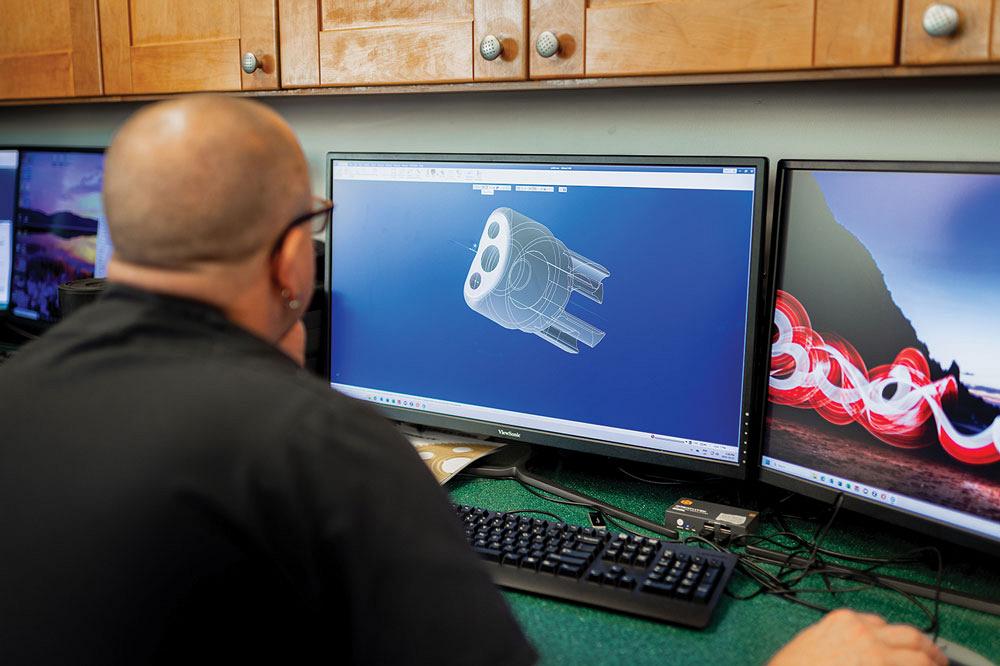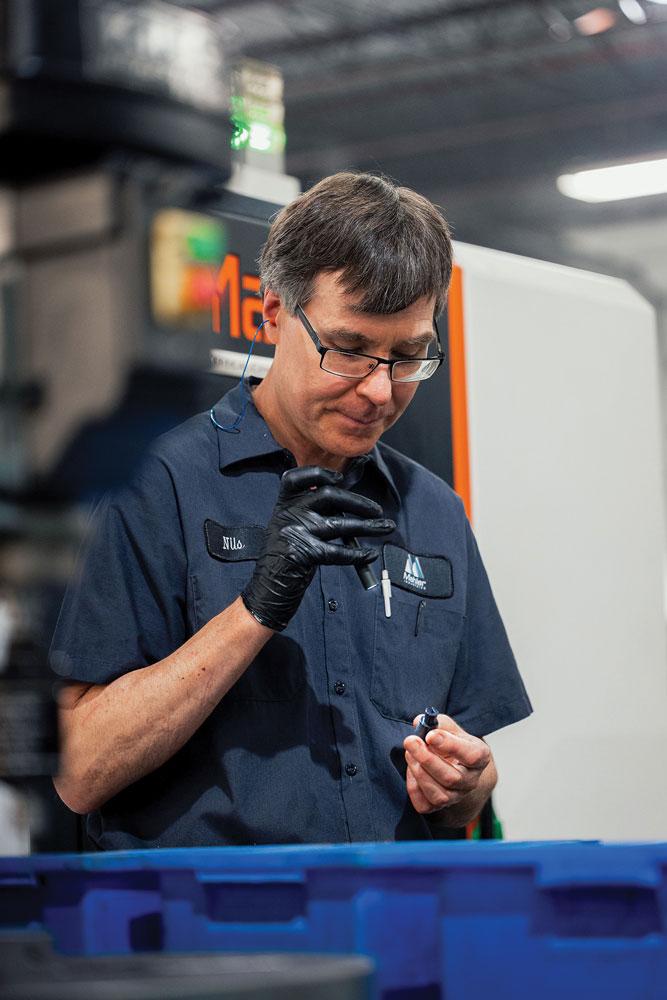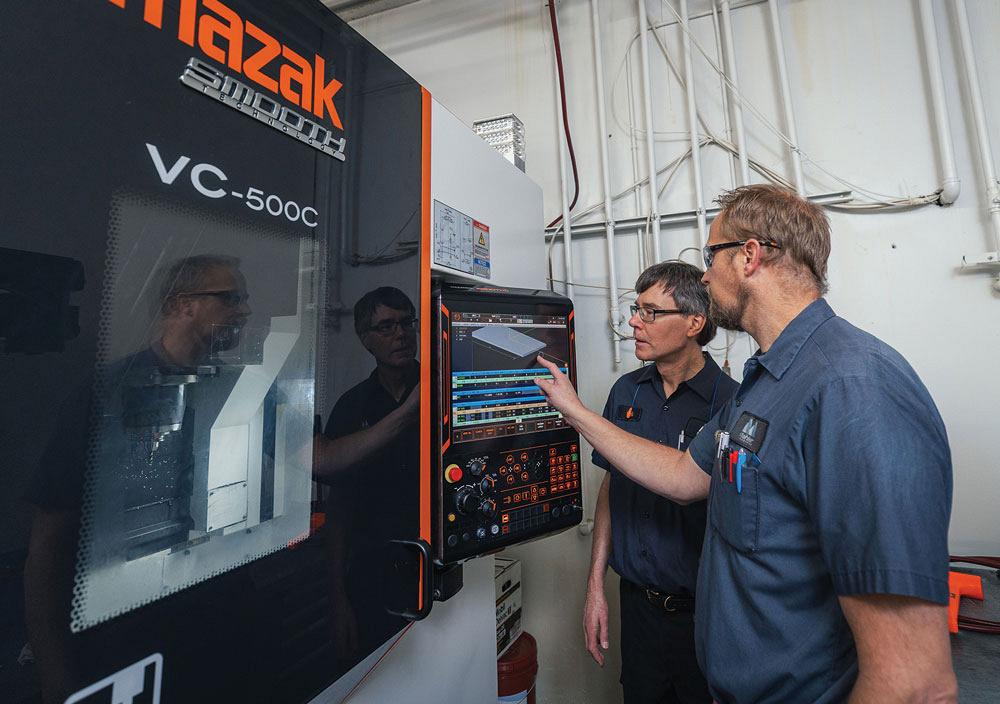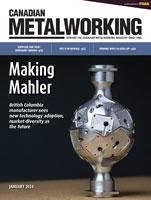Editor
- FMA
- The Fabricator
- FABTECH
- Canadian Metalworking
B.C. job shop seeks diversity, technology adoption
Mahler Machining sees new technology adoption, market diversity as the future
- By Joe Thompson
- February 8, 2024
- Article
- Metalworking
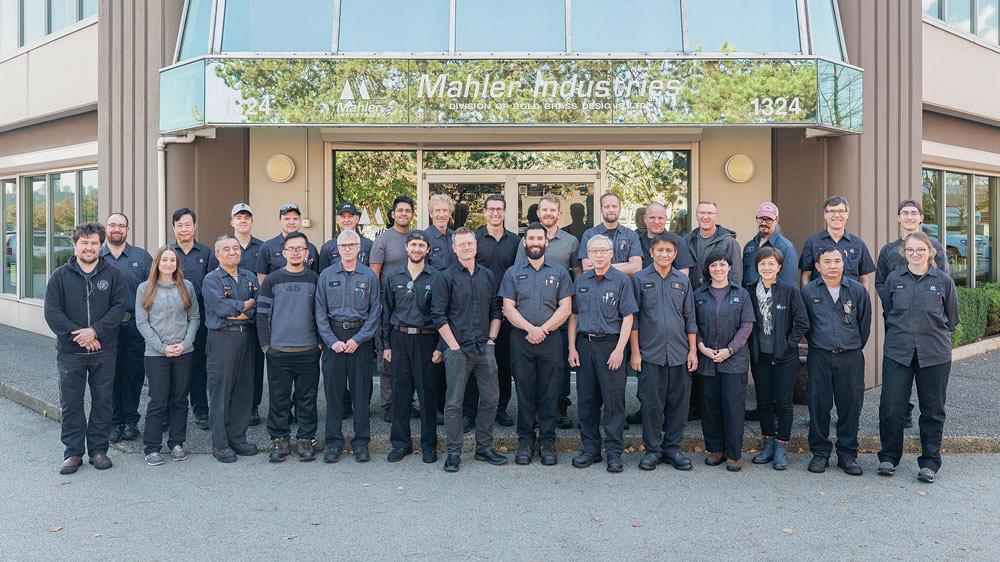
Mahler’s team has more than 250 years of experience with the company collectively. Images: Mahler Machining
The story of Mahler Machining, Coquitlam, B.C., is the story of modern Canadian manufacturing. It’s also a story that has been 40 years in the making.
Mahler Machining, or Bold Brass Designs as it was known when it opened in 1983, has grown from a manual machine shop into a CNC machining facility with 19 CNC milling and turning centres, including two 7-axis machines with live tooling, multiple lathes, and both horizontal and vertical machining capability.
The shop has even kept in touch with its roots with its own small manual machine shop that it uses mainly for prototype work. The history and growth of Mahler, from a two-person, family-owned manual machine shop in 1983 to its current ownership with 32 employees, is a great story in an industry full of going out of business signs.
Originally founded by Adam and Trudy Mahler, the company began by making brass components for OEMs on its manual machines.
Pedro Fernandes joined Mahler Machining in 1995 as a manual machinist. At that time, Mahler had 10 employees and six CNC machines. After 14 years spent working at Mahler, Fernandes along with his wife Carlynn bought the business, with Carlynn joining as vice-president of finance and administration. Under the Fernandes’s leadership, the company grew and added new employees and new machines, including 5-axis capability.
After steering the company through two recessions and a pandemic, they decided to sell the company, primarily to create more family time.
Enter The Entrepreneurs
In 2022, it was time for the business to be passed on to new owners. And in stepped Aaron Kennedy and Nik Paukkunen.
Kennedy is a long-time entrepreneur and company builder who has spent the majority of his career partnering with business owners to help them go from good to great. In 2021, he moved home to Vancouver to dedicate himself full time to the success of a single company.
Paukkunen, meanwhile, spent his career working with small businesses, startups, as well as some large multinationals as a consultant. He too was looking for a move back home to Vancouver.
Together the pair set their sights on Mahler.
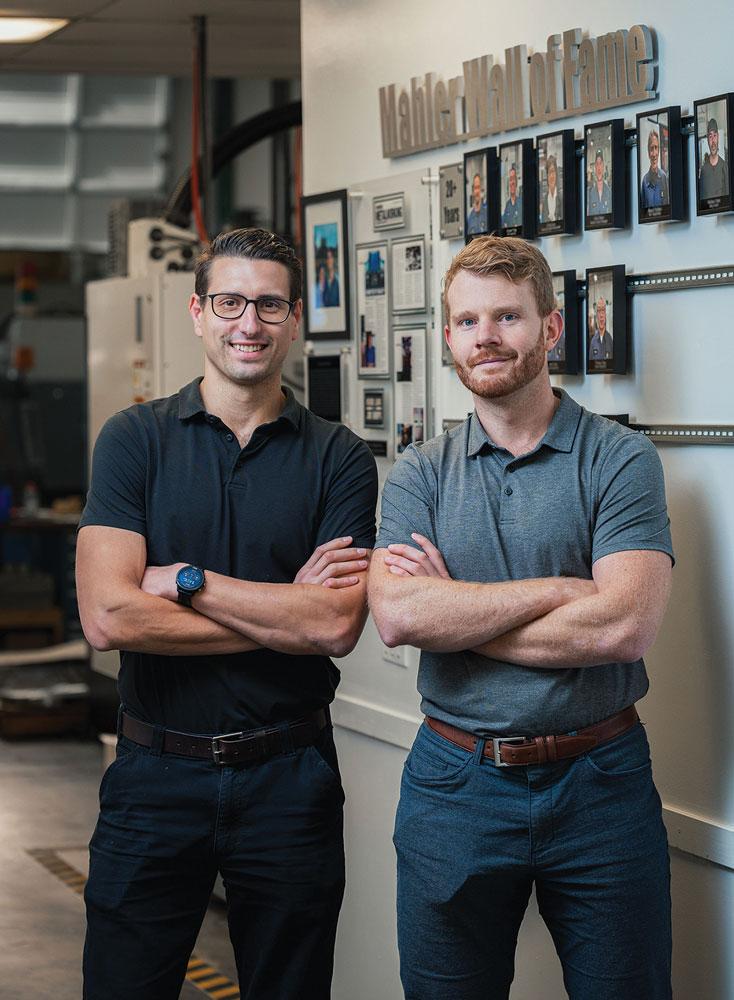
(From left): Co-CEOs Nik Paukkunen and Aaron Kennedy stand in front of the recently installed Mahler Employee Wall of Fame celebrating the company’s 40-year history.
Their plans were to find an established manufacturing business and take it to the next level by adding the latest in machining technology and combining it with the company’s existing highly skilled employees. Adding proven procedures and an organizational culture that fosters continuous improvement is their focus. The company is well known in the Lower Mainland after decades serving the aerospace, marine, medical, forestry, mining, and pulp and paper industries. It also has experience in medical, sonar technology, and even deep-sea submergence.
The company has an ISO 9001-registered quality management system and uses statistical process control (SPC) quality practices. Work is checked on measuring equipment, including a Mitutoyo Bright 710 coordinate measuring machine (CMM). CMM reports are available upon request.
Mahler’s 20,000-sq.-ft., climate-controlled space is full of equipment necessary for both short and long part runs.
“What really attracted us to the business was its strong reputation in the B.C. market together with a 40-year history of stability and steady growth,” explained Kennedy.
Their plan is to build from the hard work of the company’s previous owners and prepare it for the next phase.
Strong Reputation
“Mahler has an incredible reputation in the local marketplace for doing really tight-tolerance work, high-complexity work, and the work that frankly a lot of shops turn down,” said Kennedy. “And a lot of that work, more than 50 per cent of it, comes from customers that have been with us for more than 10 years.”
In the job shop world, which can be very cyclical and has a lot of customer turnover, having a steady stream of work often is a luxury, as is any kind of long-term contract. That’s what makes having long-term relationships better than any kind of contractual agreement.
“When we saw the tenure of the customer base here at Mahler, which we think is directly reflective of the quality, it really spoke volumes about the incredible work that's done here by the team. That's a lot of what attracted us to the business,” said Kennedy.
Mahler was the right shop at the right time.
“We were looking to find a business that was in manufacturing, was very close to its customers, and had room to grow,” said Paukkunen. “We believe with confidence that more parts are coming back onshore, especially with what we saw during the recent shipping crisis. The proliferation of new OEMs and the demand for complex metal components is something that's going to persist in the long term. We saw an industry that was at a point in time that was really attractive to us, and that's how we narrowed in on Mahler.”
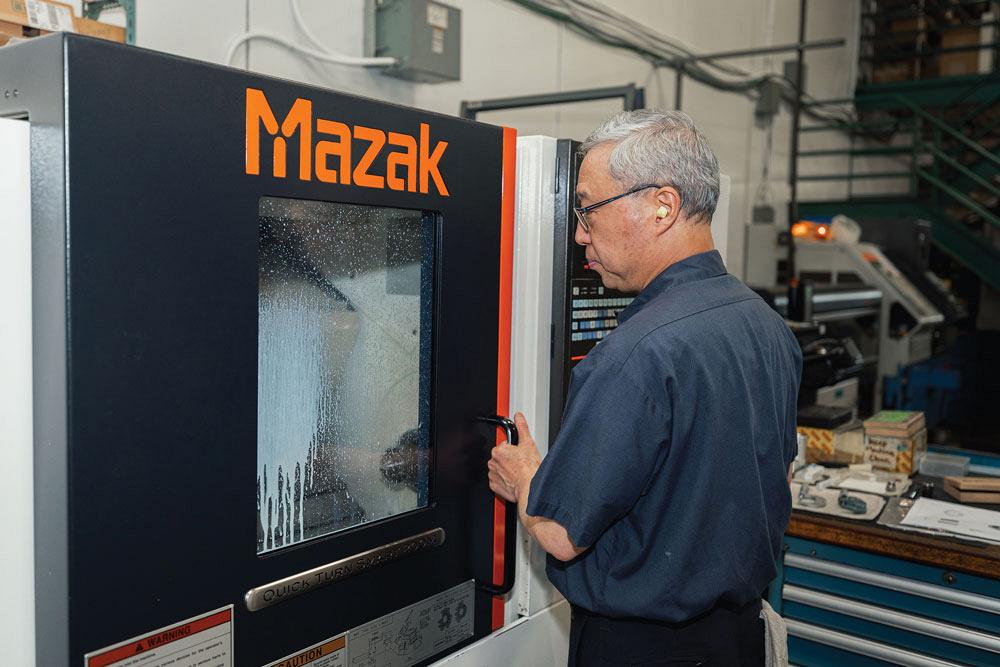
Thomas Tang works on the company’s Mazak QT200M. Small turning has been a fast-growing segment for Mahler, which led to the company acquiring a new Mazak QT100MSY in November 2023.
Understanding British Columbia
To a lot of central and eastern Canadian businesses, the West Coast may seem as far away as Mars. But, just like B.C. has its own natural ecosystem, it has its own local business ecosystem too. While it often is tethered to outside influences, the local manufacturing sector is strong and varied.
Traditionally seen as a hotbed of forestry, mining, and shipbuilding work, B.C. has quietly been fostering a thriving medical and clean-tech sector as well.
Historically, around 80 per cent of Mahler’s business has come from serving customers in the B.C. market. While it has served customers across the country and into the U.S., the core of its business has always been B.C.-focused.
“The B.C. markets are pretty interesting and unique. The stereotype is that it’s a resource-heavy sector. But it’s actually incredibly diverse,” said Paukkunen.
This is how the company itself has gotten so diverse. It’s a good idea to be able to produce parts for numerous sectors. And it helps if you know they have a local need. You don’t just dive into the submersible parts manufacturing market without knowing that a lot of deep-sea submersible companies operate out of B.C.
“Obviously there is a lot of heavy work and mining here and some oil and gas work that spills into the province from Alberta. But we do a lot of work in aerospace and forestry too. That creates diversity,” said Kennedy. “And when we were thinking about building a business over the long term, we placed a high value on stability. Our stability is based on our diversity, and I think it's one of the reasons why we've been able to be around for 40 years and steadily grow.”
Not being solely dependent on one particular industry means the company can weather a downturn because it is not closely aligned with one specific sector.
“Most of our customers are not parts manufacturers. They don't have or want those capabilities in-house because it's not core to what they do. They can then focus on design, engineering, and marketing their brand and their products,” said Kennedy.
These OEMs might assemble the parts shipped to them but, because machining is such a capital equipment-intensive enterprise, they need their parts made by experts in programming and machining.
That’s why it has been important for Mahler to remain up to date with its equipment. With 19 CNC machines, the company has the ability to make both tiny medical implants and large, complex parts. The company also works with subcontractors to handle any finishing requirements such as heat treating, plating, anodizing, and grinding.
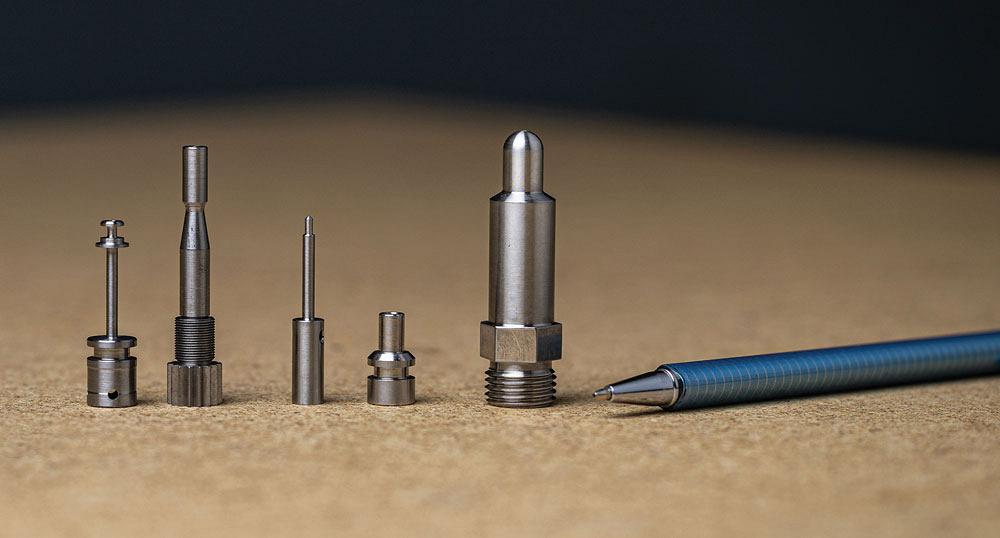
Medical device components from 1/8th-in. bar stock is a fast-growing part of Mahler Machining’s business.
“We really embrace prototype work, highly complex work, and of course, we love production work,” said Kennedy. “We also offer a purchasing arrangement that keeps our customers’ finished parts on the shelf here, which is enticing for some companies.”
The sweet spot for Mahler starts with creating a prototype and turning that business into a full production run.
“We start by making parts in ones and twos with the hope of then getting higher volume from the customer,” said Paukkunen. “We typically start working with their engineers to show them the specific tolerances we can machine to and the GD&T [geometric dimensioning and tolerancing] we can achieve.”
The company can provide this kind of service because it has the machines and staff to ramp up to production volumes of thousands of parts per month. Even though these production levels can be achieved, a typical order for Mahler is between 20 to 100 highly complex parts.
“Our staff is key too. We have 200-plus years of machining experience on the production floor,” said Paukkunen. “And one thing that is different in our shop compared to many others is that we don't have dedicated programmers. All our machinists know how to start with the drawing, then program it, do the setup, and run the job.”
“It’s a world-class team and that's really a credit to the former owner Pedro,” added Kennedy. “Our foreman, QC manager, shipping manager, office administrator, and a handful of our senior machinists are all 20-plus-year employees. Our sales manager Graham Day has been with the company for over 15 years. The company was really well built, and our team has a ton of pride in what they do.”
Moving Mahler Forward
With that kind of experience, Kennedy and Paukkunen can focus on building customer relationships to grow the business.
“Nik spends a lot of his time managing production and making sure we're doing things to optimize our production schedule efficiently. And we really lean heavily on our tenured employees. We also inherited a terrific culture. We feel very fortunate to have walked into a place where everyone is very eager to share their knowledge with one another,” said Kennedy.
As part of its ISO certification, the company undergoes six internal audits per year on its processes. Each function of the company gets examined, and recent audits included a look at production planning and another on order intake.
Sometimes it’s deemed that no changes are necessary, which was the case for the company’s material purchasing process. However, it did reveal a needed change in material storage.
It’s not all business at Mahler, though. Time and energy have been spent looking to the future, specifically the future of the skilled labour pool. The company recently partnered with British Columbia Institute of Technology (BCIT) and now has two machining interns working on the shop floor.
“We're really proud of having brought in two students from BCIT. We also have a third person, a current employee that we're paying to go back to BCIT for additional training. It’s been a really strong partnership for us,” said Paukkunen. “We're focusing on creating an environment that is attractive and appealing to younger employees.”
The company is setting the stage with these training opportunities to give its staff the ability to upskill.
Ideally those interns will become employees and part of the Mahler family and run the next generation of manufacturing equipment. And it is the ongoing investment in CNC equipment that in many ways sets the company apart.
And that equipment also has local ties.
“One of the reasons that we are a Mazak shop is that they have dedicated sales, dedicated service, and application support in the province,” said Kennedy. “In the unfortunate event that we do have a machine go down or need some support, we often have someone from their service team here the same day or the next day. That's incredibly important.”
Mahler added two new Mazak CNC machines in two months at the end of 2023. Both are new machines for the company, which expand its capacity. Most of the company’s smaller turning centres are also equipped with bar feeders.
“We recently invested in a Mazak Quick Turn 100MSY with live tooling, Y-axis travel, and a subspindle. We're seeing very strong growth in certain areas on the small turning side of our business, led by a few industries, including medical,” said Kennedy. “Some of those parts have quite high complexities and require two operations. Rather than taking that part out, setting it up in a second operation, this new machine allows us to do it all in one machine in one setup”
Most of the company’s machines are equipped with in-machine part and tool probing. It also sends a lot of parts to its CMM.
“Proving out the quality is the bedrock of our business,” said Paukkunen. “We'll do first article inspection on all operations for each part. If the part has five operations, we do a dimensional check with frequency checks for each individual op.”
If the customer requires it, Mahler will do a full inspection on every part.
“We even have customers that come in and do internal audits on all our systems, which we welcome,” said Paukkunen. “Those are great learning experiences for us. There have been things flagged in those audits that we used to improve our business.”
Editor Joe Thompson can be reached at jthompson@fmamfg.org.
Mahler Machining, www.mahler-machining.com
About the Author

Joe Thompson
416-1154 Warden Avenue
Toronto, M1R 0A1 Canada
905-315-8226
Joe Thompson has been covering the Canadian manufacturing sector for more than two decades. He is responsible for the day-to-day editorial direction of the magazine, providing a uniquely Canadian look at the world of metal manufacturing.
An award-winning writer and graduate of the Sheridan College journalism program, he has published articles worldwide in a variety of industries, including manufacturing, pharmaceutical, medical, infrastructure, and entertainment.
subscribe now


Keep up to date with the latest news, events, and technology for all things metal from our pair of monthly magazines written specifically for Canadian manufacturers!
Start Your Free Subscription- Trending Articles
Automating additive manufacturing

Sustainability Analyzer Tool helps users measure and reduce carbon footprint

CTMA launches another round of Career-Ready program

Sandvik Coromant hosts workforce development event empowering young women in manufacturing

GF Machining Solutions names managing director and head of market region North and Central Americas

- Industry Events
MME Winnipeg
- April 30, 2024
- Winnipeg, ON Canada
CTMA Economic Uncertainty: Helping You Navigate Windsor Seminar
- April 30, 2024
- Windsor, ON Canada
CTMA Economic Uncertainty: Helping You Navigate Kitchener Seminar
- May 2, 2024
- Kitchener, ON Canada
Automate 2024
- May 6 - 9, 2024
- Chicago, IL
ANCA Open House
- May 7 - 8, 2024
- Wixom, MI













